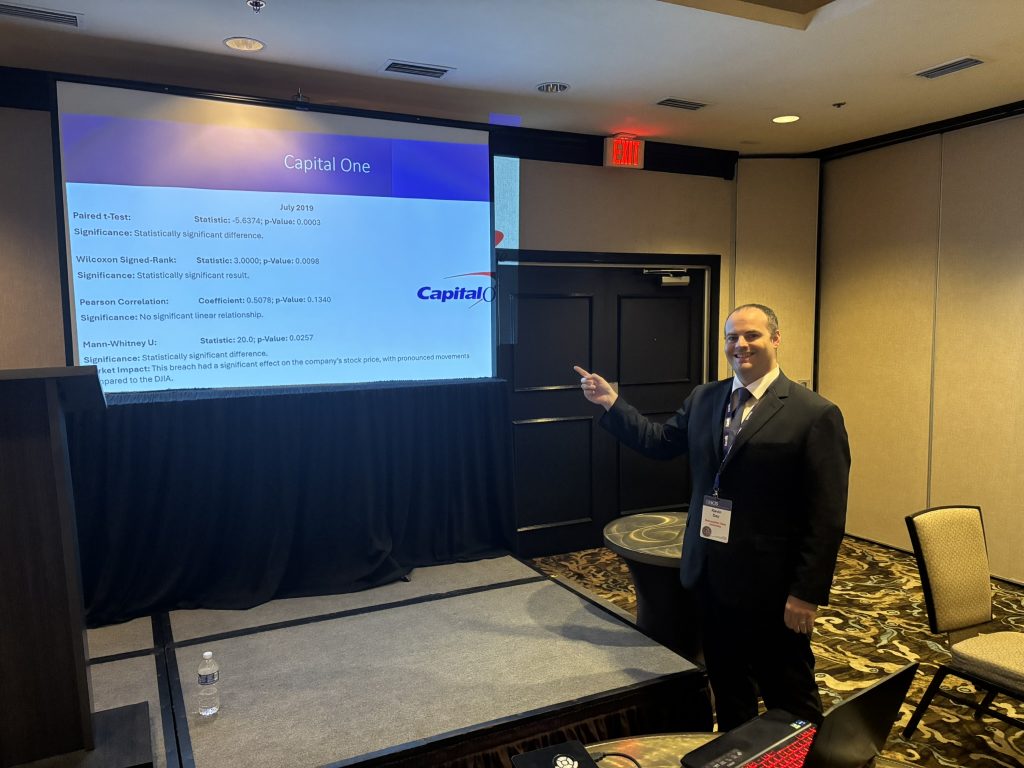On November 11, 2024 by Kevin Day

Who Am I?
I am a graduate student at Metropolitan State University, finishing a master’s degree in cyber operations within the College of Science. With a strong foundation in cybersecurity and data analysis, my recent research project “Market Reactions to Cybersecurity Incidents: A Case Study Approach”, examines the financial impact of data breaches on publicly traded companies, offering critical insights into the business ramifications of cyber incidents. My goal is to help organizations understand the true cost of cybersecurity failures and develop proactive defenses against emerging threats. By combining technical rigor with a strategic mindset, I strive to make an impactful contribution to the evolving field of cybersecurity.
My Experience at the 64th IACIS Annual Conference
From October 2-5, 2024, I had the privilege of attending the 64th Annual International Association for Computer Information Systems (IACIS) Conference at the beautiful One Ocean Resort and Spa in Atlantic Beach, Florida. This year’s conference theme, Artificial Intelligence (AI) & Machine Learning (ML), drew together a global community of industry leaders, academics, and students eager to share and explore the latest advancements, groundbreaking research, and practical applications shaping these fields.
As both a presenter and participant, I was honored to share my research on the financial impact of cybersecurity breaches, connecting with peers and gaining valuable feedback that will shape my future work. The conference offered an inspiring environment to exchange ideas and examine AI’s transformative role across industries—particularly in the critical realm of cybersecurity. The event’s dynamic sessions emphasized how AI and ML are redefining sectors like education, business, and information security, underscoring their vast potential and profound implications for society.
One of the most memorable moments of the conference was the keynote address by Lynne Clark, Deputy Chief of the Center for Cybersecurity Education, Innovation, and Outreach at the National Security Agency (NSA). With over two decades of service at the NSA, Clark has led pivotal initiatives, including the Centers of Academic Excellence in Cybersecurity (NCAE-C) and the GenCyber summer programs, both aimed at strengthening cybersecurity education and preparing the next generation of cyber professionals. Her speech highlighted the urgency of advancing cybersecurity measures as AI evolves, stressing the importance of collaboration and innovation to address emerging challenges.
Presenting My Research: The Financial Impact of Cybersecurity Breaches
At the IACIS conference, I had the opportunity to present my research titled “Market Reactions to Cybersecurity Incidents: A Case Study Approach”, which explores how cybersecurity breaches impact the stock prices of publicly traded companies. The study focuses on high-profile incidents involving firms like Capital One, Equifax, Facebook, Google, JBS S.A., MGM Resorts International, Nvidia, Okta, SolarWinds, and T-Mobile. These breaches, often accompanied by significant media attention, provide a unique lens through which to examine the financial repercussions that follow public disclosure of such events.
The analysis utilized an event study methodology, a well-established approach for assessing the impact of specific events on stock performance. By comparing stock price fluctuations surrounding breach announcements relative to the Dow Jones Industrial Average (DJIA), the study examined whether these companies experienced significant deviations from market expectations. The methodology incorporated statistical tests such as paired t-tests, Wilcoxon signed-rank tests, and correlation analyses to measure the magnitude and direction of stock price changes. The findings revealed statistically significant declines in stock prices following breach announcements, underscoring the negative financial consequences these companies face.
These results highlight the urgent need for businesses to invest in robust cybersecurity frameworks and implement proactive incident response strategies to mitigate financial damage. Companies that fail to address cybersecurity risks not only jeopardize their operational integrity but also risk eroding investor confidence, leading to further instability. The insights from this study serve as a call to action for organizations to prioritize cybersecurity as a critical component of corporate governance
For those interested in reading the full study, you can access it here.
Networking and Collaboration
In addition to the insightful presentations and panels, the 64th IACIS Conference served as an invaluable platform for networking and collaboration. With participants from diverse backgrounds in academia and industry, I had the opportunity to engage with leading experts across fields, particularly in cybersecurity and AI. These discussions often centered on the broader implications of cybersecurity incidents—how breaches not only affect the immediate company but also reverberate throughout the market, impacting investor confidence and corporate stability. One especially engaging conversation followed the presentation of Fred Hoffman from Mercyhurst University on the importance of open-source intelligence in cybersecurity, which provided a practical lens through which to view the ongoing evolution of security measures.
Beyond the sessions, I had the chance to receive valuable feedback on my own research. Conversations with peers and industry professionals sparked fresh ideas for future work, particularly in the realm of AI’s application to cybersecurity. A session that stood out was one on dual digital twins, presented by Chase Peterson from Metropolitan State University, where the concept of digital twins enhancing a company’s cybersecurity posture was particularly compelling. Additionally, the ethical implications of AI’s growing role in security were a recurring theme. Many discussions touched on how AI can bolster security efforts, yet simultaneously raise questions around privacy, data misuse, and potential bias in algorithmic decision-making—issues highlighted in sessions such as Artificial Intelligence Applications in Education chaired by Vince Orlando of Ball State University.
These conversations emphasized the importance of balancing innovation with responsible, ethical practices. The conference reinforced the need for collaboration between academia, industry, and policymakers to navigate the rapidly evolving landscape of AI and cybersecurity. Through networking, I gained deeper insights that will undoubtedly shape the direction of my future research as I continue exploring how these powerful technologies can be leveraged responsibly to protect both organizations and individuals.
Looking Forward
Attending the IACIS conference has further solidified my understanding of the symbiotic relationship between AI and cybersecurity. As AI continues to evolve, it will not only shape how we manage data and predict threats but also how we address ethical concerns around privacy and security. I am excited to continue my research in this field, particularly in how companies can mitigate the financial fallout from cybersecurity breaches. The insights I gained from the conference, coupled with the feedback on my own research, will undoubtedly influence my future work and contribute to ongoing discussions in both academic and professional spaces.
Looking ahead, the 65th IACIS Annual Conference, set for October 1-4, 2025, at the Sheraton Sand Key Resort in Clearwater Beach, Florida, offers an incredible opportunity for students to showcase their research and represent Metropolitan State University on a national stage. Participating in this prestigious conference not only highlights the cutting-edge work being done at our university but also opens doors for networking with leading experts in fields like artificial intelligence, cybersecurity, and data science. I strongly encourage students to submit papers and present their findings. It’s a chance to contribute to important discussions, gain valuable feedback, and expand your professional horizons, all while showcasing the innovation and scholarship happening right here at Metro State.
https://www.iacis.org/conference/conference.php
Acknowledgment
I would like to extend my gratitude to Dr. Queen Booker, Associate Professor in the College of Management, whose encouragement and expertise were invaluable to the success of this project. Dr. Booker provided thoughtful guidance and consistently challenged me to deepen my analysis and sharpen my insights. Her encouragement was pivotal in inspiring me to submit my work to the IACIS conference, where I had the rewarding opportunity to share my findings with the broader academic and professional community. Dr. Booker’s mentorship not only shaped the direction and quality of my research but also fostered my growth as a researcher. I am profoundly grateful for her unwavering support, insightful feedback, and dedication to my development.
Presentation
I am presenting my research to the campus community. This presentation delves into the financial impact of recent cybersecurity breaches on the stock prices of high-profile, publicly traded companies. Through detailed data analysis using Python, I examine stock price deviations following these incidents, revealing consistent financial repercussions that underscore the importance of robust cybersecurity and incident response strategies. Join me to explore these findings and discuss the critical link between cybersecurity practices and market stability.
